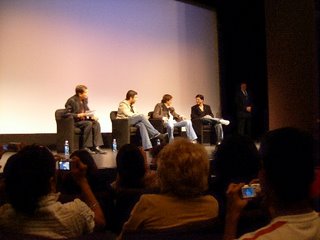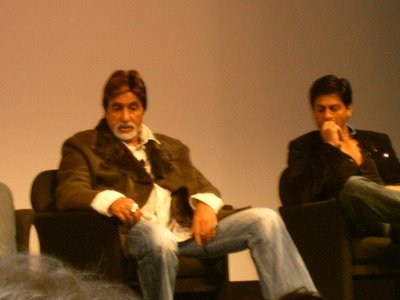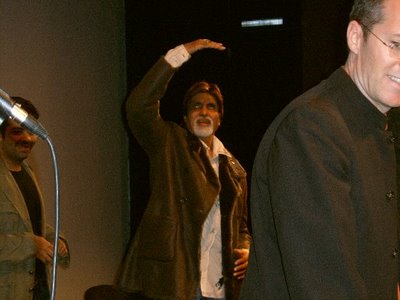The League of Extra-Ordinary "CHOORS"
The League of Extra-Ordinary "CHOORS"
Featuring:
Two jobs, two faces, one-in-all and all-in-one:
PERVEZ MUSHY
The new but never-improved, imported from Dubai:
BENAZIR BHUTO
The Pir from London:
ALTAF HUSSAIN
AND
The ever-corrupt and never-silent:
THE CHAUDARY BROTHERS
COMING SOON
(based on peitions in Supreme Court)
Available NATIONWIDE and having their hands in everyone's pockets
Disclaimer: Not rated as yet by Censor Board of Pakistan. This feature presentation may contain disturbing images of corruption, arrogance, neglect and gross human-right violation. This presentation is not suitable for light-hearted people as it may contain images of rape of an entire nation of 160 million.
Pervez Musharaf coming to The Daily Show with Jon Stewart

As most of you guys would know that Mushy is coming to States for a UN Session and giving Bush some updates, but he is also going to be launching his autobiography, called "In the Line of Fire". As per
Adil Najam, he is also scheduled for an appearance on The Daily Show with Jon Stewart on Tuesday, September 26,2006. This is goning to be a very interesting interview for Mushraf. I hope he knows what he is getting into, cos this is not going to be a regular CNN, NBC, CBS interview. Jon is quite sharp and witty and would not refrain on making any sorts of comments to Musharaf. He has already passed smart comments during his interviews with many leading US politicians and guests. So Musharaf better do his homework before facing Jon Stewart.
Good thing for Musharaf is the Jon Stewart's show has become one of the highest watched political shows and besides winning 2 Emmys this year, its also commands a strong politicaly educated viewership. Almost every political and current affairs writer tries to get on The Daily Show right after launching their books. So atleast Musharaf is doing the right thing and addressing to the right audience for the purpose of spreading the word about his book.
So make sure you guys mark September 26 and watch Jon Stewart's Daily Show at 11:00 PM EST on Comedy Central.
P.S: Musharaf will also be interviewed by CBS, NBC, CNN, etc. For those dates check Adil's blog.
An interview with Hasan Nasrallah of Hezbollah (1998)
Dr. Eqbal Ahmed, Pakistani intellect, scholar, journalist and Professor on Middle East Studies, carried out this indepth interview with Hassan Nasrallah of Hezbollah in July, 1998. This may provide some insight into the man whose on the hitlist of Israeli Forces and USA. Much of this information is missing from mainstream media, hence we have to look back into history and thank great Dr. Eqbal Ahmed for this. Dr. Eqbal Ahmed died a year later in 1999.
Encounter with an Islamist
By Eqbal Ahmad
INSIDE the Imam al-Mehdi school in Ouzai, a Lebanese village near the Israel-Lebanon border, seven coffins lay in a row. Outside, men were preparing for their burial when a small convoy of cars arrived bearing, among others, the Secretary-General of Hezbollah, the largest among the armed parties which have for fifteen years resisted Israel’s occupation of southern Lebanon.
The coffins held the Hezbollah fighters who had fallen in past battles. They were among the 40 Lebanese ‘prisoners’, dead and alive, who came home on that day, June 26, 1998, in exchange for the remains of an Israeli soldier.
Sayyad Hasan Nasrallah entered the hall in solemn dignity accompanied by Jawad, his teenage son. He stopped before each coffin and offered Fateha until he reached the one marked number 13. He beckoned an aide and spoke to him whispering.
The aide summoned two workers of the Islamic Health Association, a Hezbollah outfit. They opened the coffin, exposing a body wrapped in a white shroud.
Sheikh Hasan Nasrallah closed his eyes, his lips trembled as he offered Fateha. Slowly he bent over and tenderly stroked the head of Hadi Nasrallah, his eldest son who was 18 years old when he died in battle on the 13th day of last September.
Jawad, the younger son, stood still and pale next to his father. A deep silence fell in the room while his right hand rested on his son’s chest. It was broken by the clicking of the reporters’ camera, but was promptly restored when Sheikh Hasan looked up in cold surprise.
I witnessed the event on television and also read a sensitive account of the awesome scene in the Daily Star, Beirut’s English daily. So when Eric Rouleau, Le Monde’s eminent Middle East reporter until he became France’s ambassador to Tunisia then Turkey, suggested that we meet Sheikh Hasan Nasrallah I readily agreed.
Colleagues from the daily Al-Safir arranged the meeting and took us into the well-guarded Shia neighbourhood in Beirut which serves as the Hezbollah’s headquarters.
Our first surprise: women modestly dressed but without hijab moved about their business even inside the Hezbollah compound. Another notable observation: unlike the erstwhile PLO compounds and offices in Beirut, there were but few uniformed and armed men visibly around. The stronghold of this most effective armed organisation in the Middle East had a completely civilian look, a fact that normally implies intelligent and efficient security arrangement.
Sheikh Nasrallah met us in an adequately furnished apartment which apparently serves as the leadership’s meeting place. At the entrance, we were met by a large, framed photograph of Ayatollah Ruhollah Khomeini. A rough large rug of Qum design covered the sitting area of the meeting room. A clock and two framed Quranic verses hung on the wall. The fresh flowers on the side table were tastefully arranged next to a framed photograph of his son Hadi, in parachuter’s uniform, his sparse beard sprouting green.
The Sheikh is 38 years old, of medium height, round white face framed in black beard, clear brown eyes behind glasses suggest a shrewd and good humoured man. He wore the black turban and tunic of the Shia cleric.
A bit of forelock defiantly protruded out the turban, hinting that the Sheikh does not quite conform to the commonly held notion of the proper Islamic hair-cut. An aide, austere looking man of about 35, also sat in the room and occasionally joined in the discussion.
“I understand you studied in Qum?” I asked at one point. “Not quite”, he said, “I was there only two months. I went to school right here in Beirut where my family lived. My father was a vegetable vendor, poor migrants from southern Lebanon, large family. No one from my family had been a cleric before; I am one of those few who have no family claim to this profession. After the madressah in Beirut, I was selected to study in Najaf Sharif where I spent two years, then returned to finish my studies in Baalbek.”
When did you become involved in politics? “I joined Amal (Shia party led by Nabih Barri) at age 14 and was elected head of the party in my town at age 18. When I left Amal I was a member of the party’s Central Committee. I left Amal, rather I was expelled from it, in 1982 after the Israeli invasion because I was among those who wanted armed resistance against the Israeli occupation.”
This was a fair profile of the average Hezbollah leaders and cadres. Most come from poor Shia families from the south of Lebanon, most have served their political probation in Amal or the Palestinian Fatah. For most of them Islamic and Shia politics has been a vehicle of communal as well as individual mobility.
Sheikh Hasan Nasrallah rose to become the Hezbollah Chief of Military Operations, then its General Secretary, and remains a prize quarry of Israel’s military and intelligence services.
We began by asking how his party reconciles the demands of contemporary life with religious laws and traditions which date back to the Middle Ages? How does Hezbollah propose to negotiate the often large gaps between tradition and modernity? Notably absent from his reply were the stock assertions of the eternal and universal nature of Shariat.
“We should begin by noting a significant difference in the doctrinal development of Sunni and Shia schools of thought,” he said. Among the Sunnis, the doors of ijtihad were closed some centuries ago, and despite the advocacy of several Sunni scholars they have not been reopened.
“In the Shia tradition the doors of ijtihad were never closed, and the mujtahid has remained a figure of great importance and influence.”
The Sheikh proceeded to explain that the ‘consequences of this openness are far-reaching. It can affect in profound ways the relationship between state and religion, law and society, the community and its traditions. Ijtihad makes permissible adaptations to the requirements of time and place, permits one to respond to new demands, be they specific or general, upon the individual and community, state and society. It allows a Muslim society to dispense with traditional forms and practices when they are not any more appropriate to its needs, and encourages the evolution of new forms. There is a need to expand the scope of ijtihad in all schools of Islamic thought’.
Fair enough, but how do you reconcile the existence of an Islamic party in Lebanon, a multi-religious, multi-denominational country in which no one party can impose its ideological agenda on all others? In other words, why an Islamic party in a country which cannot accommodate an Islamic statehood?
Sheikh Nasrallah’s reply: “Your question assumes the uniformity of mission and political agenda among Islamic parties. Between Hezbollah and the Taliban there is a large gap of objective and outlook (smile and the cast of an ironic eye at his Pakistani guest!); yet both are Islamic. Our primary objective has been resistance to Israeli occupation. The year 1993 was a watershed of sorts as Israel’s invasion then and our resistance to it brought us national legitimacy so that even Christians accept Hezbollah as an authentic national force. As for our ideological mission, to be Islamic in Lebanon entails the Islamisation of the Muslim individual and community, its values and way of life.”
Given the centrality of resistance against Israel to Hezbollah’s programme and party structure, we raised a question about the scope and future of armed resistance. What will happen to it when Israel withdraws from Lebanon which, in view of its recent demarche, may in fact occur? “We shall not accept a withdrawal based on conditions on which Israel insists. Liberation can not be conditional. Israel committed aggression, it occupies our land, it is our sacred right to resist, and this resistance shall continue until it withdraws.”
Does this principle apply to Palestine also, and to the Golan Heights? “The strategies of Syria and Lebanon are linked. As for the Palestinians, if their leaders compromise, there is little we can do. We cannot substitute for their leadership. If they decide to resist we shall be on their side.”
What then is his vision of Palestine? “We wish the liberation of Palestinian people among whom we count Jews, Muslims and Christians.
By then I am impressed by how closely Sheikh Nasrallah’s views parallel those of Iran’s President Mohammed Khatami and his associates. To confirm this suspicion we raise an issue which defines the divide between reformists and conservatives in contemporary Iran - the powers and role of the Faqih.
Sheikh Nasrallah’s carefully worded answer was quite nuanced. “Vilayet-i-Faqih is an elective office. He is elected by the Assembly of Experts (Majlis-i-Khabargan). So the source of his power are the people. Then there is the president who is directly elected by the people, as is the parliament (Majlis). Together, the three institutions constitute Iran’s democracy. They need to work in a framework of exchange and collaboration. Of course, the case of Imam Khomeini was special: he was the revered choice of all the people.”
Link:
http://www.dawn.com/2006/07/29/int12.htm
Piyare Manmohan - 4 Man Show
As usual the recent bomb attacks in Mumbai were blamed on Pakistan and the Indian government had to look across their border to find a scapegoat for the mishaps in their security and intelligence system. Anyhow, without getting into the details of the blame-game and related political insecurities of both the government, the following clips give a glimpse of how Indian Prime Minister is being in Pakistan.
The following clips are from a hilarious television show, 4 Man Show on
AAJTV and poke fun at the Indian Prime Minister, Manmohan Singh. I must say, the host "Khalid Butt" and his team have done a very smart job with their version of politcal humor. You can see more clips from this show on
youtube.com. There are really funny mock interviews of Hamid Karzai, Sheikh Rashid, Osama Bin Laden, Saddam Hussain, Moulana Fazl-ur-Rehman, Amitabh Bachan, etc. Search for "4ManShow" on
youtube.com for more clips.
Here are the clips from Manmohan Interview:
Part 1:
http://www.youtube.com/watch?v=GMcXJBfL9HkPart 2:
http://www.youtube.com/watch?v=J3PR5wfMzBwPart 3:
http://www.youtube.com/watch?v=E3xZuFaLa_0Enjoy in spirit of humor!!
 With the onset of Toronto International Film Festival, I got the rare opportunity to sit in the audience of a panel discussion about Bollywood. Its one thing to see these stars perform at a Live Show and another to see them engaged in casual conversation about Bollywood and its impact to the South Asian communities and the whole film feternity. The discussion was titled as "The Making of a Bollywood Blockbuster" and was conducted around the festival premier of Kabhi Alvida Naa Kehna.
With the onset of Toronto International Film Festival, I got the rare opportunity to sit in the audience of a panel discussion about Bollywood. Its one thing to see these stars perform at a Live Show and another to see them engaged in casual conversation about Bollywood and its impact to the South Asian communities and the whole film feternity. The discussion was titled as "The Making of a Bollywood Blockbuster" and was conducted around the festival premier of Kabhi Alvida Naa Kehna.



